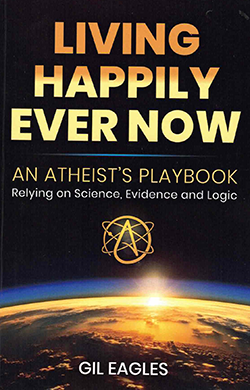Living Happily Ever Now: An Atheist’s Playbook Relying on Science, Evidence and Logic by Gil Eagles; self-published © 2024; ISBN 9798335-482028; 221 pages; $16.95 on Amazon.

 SAN DIEGO – Gil Eagles is an octogenarian and retired mentalist and hypnotist, who admits he can’t read your mind but he can by power of suggestion put you under a hypnotic spell. The ease with which his colleagues in show business can make people believe what isn’t true is similar, in his view, to some religions that get ahold of your minds from an early age.
SAN DIEGO – Gil Eagles is an octogenarian and retired mentalist and hypnotist, who admits he can’t read your mind but he can by power of suggestion put you under a hypnotic spell. The ease with which his colleagues in show business can make people believe what isn’t true is similar, in his view, to some religions that get ahold of your minds from an early age.
Eagles wasn’t always so critical of religion. Born as Igal Zyshowicz in 1940 on the island of Cyprus to Polish Jewish parents, the British government resettled his family to Tanganyika in East Africa, where he attended a British boarding school. Not speaking English and having a different name, he was bullied by his classmates. He found refuge at Christian church services, earnestly believing as a child that praying to Jesus would make him less unpopular and perhaps end his stuttering. When his family vacationed in England, he was taken to a young Hasid, the son of a rabbi, for bar mitzvah lessons. He liked the fact that the Hasid, like his parents, spoke Yiddish, but was upset when his tutor said many of Christianity’s beliefs were untrue
“Back in Africa, I didn’t like the people at the school, but I liked the religion. Now here in England, I liked the people, but I was conflicted about their religion,” Eagles wrote. “I recall thing someone must be lying or playing a joke on me. I wondered, how could people harbor such different convictions and become so distrustful and hateful towards one another?”
Eventually, he imagined people sitting in a gigantic house with an infinite set of windows. Each person’s view of the world was influenced by the location of his or her window. They could see what was in front of them, but not what was in front of the other residents. Each person’s beliefs are determined by what happens outside their individual windows. He calls this condition a person’s “prevailing awareness.” To change that awareness requires a process of accepting only what can be proven and withholding judgment on what cannot.
As an atheist, he writes, he does not claim that “God definitively does not exist.” Instead, he continues, he has an “absence of belief in a deity or a supposed higher spiritual power.” Just as theists cannot prove the existence of God, he knows that as an atheist, he cannot disprove God’s existence either. How did the universe come into being? “Before the beginning, no one knows,” he posits.
I wondered what the difference is between agnosticism and Eagles’ form of atheism. I concluded that an agnostic says “I don’t know if there is a God,” whereas Eagles says “until there is proof there is a God, I choose not to believe.”
He goes on to say if people believe in God, and don’t try to proselytize or force people to believe as they do, he wishes them well, as his parents might have said in Yiddish, zai gezunt, meaning “go and be well.”
That’s the headline discussion in his “playbook,” but he also has advice on how to set goals for yourself, forgiving people who have wronged you, and laughing off annoyances and disappointments. Life is a random series of events, he said; what happens to you cannot be programmed.
He defines “love” unromantically; in Eagles’ view when people say they “love” somebody or something, “love” refers to the “process of taking gratification from a source.” That source may be a certain type of food, a vacation spot, a pet, a romantic partner, or your child. Before anyone gets the idea that he’s advocating a Darwinian society where the fittest may take what they want, he emphasizes that “I subscribe to the moral practice of supporting all ‘life’ by doing no evil, nor inflicting intentional harm to any person, creature, thing or our planet.”
The gratification theory is in keeping with Eagles’ axiom that “the purpose of life is to enjoy it by doing all we can to stay physically and emotionally fit and to develop our mental capacity and intellectual awareness so that we may live happily ever now.”
*
Donald H. Harrison is publisher and editor of San Diego Jewish World.